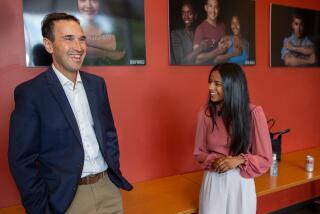Makeover for MBA Programs
- Share via
Suddenly, it seems, the teaching of business needs to learn a lesson. Business schools are in a crisis as applications for masters of business administration degrees are down 20% to 30% at most major universities.
Faculties and administrators at 300 business schools nationwide are trying to change their curricula, alter their approaches and lift their enrollments.
That’s a sharp contrast to the glory days of the MBA in the late 1990s, when business schools set the tone for corporate policies and young people strode out of graduate courses with high-five-figure salaries plus signing bonuses to go to work for big corporations, consulting firms and investment banks.
What happened?
First, the post-dot-com recession chilled business’ eagerness to hire MBAs. More recently, many corporations have criticized business graduates for being too narrow in their knowledge and lacking in leadership.
The result: fewer good jobs after school, and few if any signing bonuses.
That has led many prospective students to avoid MBA programs, which can cost $60,000 for two years of tuition.
Not surprisingly, given those fundamentals, business schools are wallowing in self-criticism.
Warren Bennis and James O’Toole of USC’s Marshall School of Business recently criticized MBA programs in a Harvard Business Review article for teaching too many courses on techniques of finance and marketing and not enough on leading people, encouraging innovation and building businesses.
“They are teaching courses for middle managers,” says Bennis in an interview, “when they need to prepare leaders.”
To be fair, the schools themselves can’t shoulder all the blame. The events of 9/11 also have had an impact. Fewer foreign students are going to U.S. business schools because of visa restrictions imposed after 9/11. That is pushing students to schools outside the U.S., where 75 business academies hold an accreditation equivalent to that of universities here.
So what? Why should anyone care, given that MBAs were seen as a snotty lot when they were riding high? Because those famous words of Calvin Coolidge still ring true: The business of America is business.
And American business is being challenged in a vastly expanded global economy, says Paul Merage, an Orange County entrepreneur whose company, Chef America, developed Hot Pockets microwave meals and made him wealthy when he sold the firm to Nestle in 2002.
“There are billions more people in the world economy today eager to do the work we do,” Merage said in a recent speech. “So we must retool the culture of our businesses”
As an example, Merage cited Irvine-based Broadcom Corp., which owns 1,000 patents for specialized communication semiconductors but subcontracts its manufacturing to Asia. Merage’s point is that Broadcom is competing in the global economy by taking advantage of its capabilities, putting its invested capital strongly behind innovation and product development while using half a dozen suppliers in Asia to manufacture its chips. To Merage, that puts the priorities on innovation and growth and conserving capital, necessities for a U.S. company.
“We must leapfrog the world,” he has said repeatedly in remarks and speeches.
And Merage, who immigrated to the U.S. from Iran as a teenager, put his money where his mouth is by donating $30 million to the business school at UC Irvine this year. The school changed its name to the Paul Merage School of Business and altered its curriculum to one that Dean Andrew Policano says stresses integrating all the usual subjects into a program for “growing a business.”
Curriculum overhauls are underway at business schools all over, as evidenced by what’s going on in Southern California alone.
At USC, Dean Yash Gupta of the Marshall School has created a new approach for the coming year in which students will change courses every 7 1/2 weeks and study more subjects. Also, in their second year they will specialize in one or two industries.
Specialization is central to the new Rady School at UC San Diego, which starts formal classes this fall to train business managers for companies in biotechnology and the life sciences -- specialties of the university itself and the nearby Salk and Scripps institutes.
Reflecting Southern California’s culture of small business and immigration, the UCLA Anderson School of Management will continue to stress courses in entrepreneurship. “Many of our students are first- and second-generation Americans,” says Dean Bruce Willison.
And the Argyros School at Chapman University, which has an MBA program for part-time students as well as undergraduate training in business, will start a full-time MBA program this fall in conjunction with the university’s law school that will offer a combined MBA and juris doctor degree.
Will it all be too much? In a time of declining enrollment, are business schools in danger of being in oversupply?
Possibly, says Cornelis de Kluyver, dean of Claremont University’s Peter F. Drucker-Masatoshi Ito Graduate School of Management. With visa problems and improvements in overseas business schools, De Kluyver believes that foreign students won’t return to the U.S. in big numbers. So he is reaching out for partnerships with schools in Japan and China to teach global business.
Peter Drucker, still active at 96 on the faculty of the school that bears his name, would approve of all the adaptability in the business school field. Over 70 years and 36 published volumes on management, Drucker has never written about technique, never advocated jargon-happy simplicities like “supply chain management” and “Six Sigma” cost control programs. Rather he always has described the organization and leadership of business as an advance of human effort and a skill demanding vision and integrity.
The business schools of Southern California and across the nation, challenged as they are, also appear to be recognizing that their mission involves more than technique. So they are rediscovering a higher calling, a need to teach more serious business, if you will.
Business education and management as a science are largely American inventions, another contribution to the emerging global economy. As they contemplate the coming scholastic year, deans of business uniformly hope that their reinvigorated purpose will attract appreciation -- and higher enrollments -- here at home.
*
James Flanigan can be reached at jim.flanigan@latimes.com.
More to Read
Inside the business of entertainment
The Wide Shot brings you news, analysis and insights on everything from streaming wars to production — and what it all means for the future.
You may occasionally receive promotional content from the Los Angeles Times.










